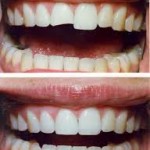 In Tooth Bonding or Dental Bonding, the composite resins are applied to the teeth and then they are made hardened using the help of special light. It is mainly used for tooth restoration and improving tooth appearance. Basically, bonding will cover any natural flaws applying a thin coating of a plastic material on the front surface of your teeth. After this, your cosmetic dentist will apply a bonding material and sculpt and color and shape it to provide a pleasing result. A high-intensity light then hardens the plastic, and the surface is finely polished.
In Tooth Bonding or Dental Bonding, the composite resins are applied to the teeth and then they are made hardened using the help of special light. It is mainly used for tooth restoration and improving tooth appearance. Basically, bonding will cover any natural flaws applying a thin coating of a plastic material on the front surface of your teeth. After this, your cosmetic dentist will apply a bonding material and sculpt and color and shape it to provide a pleasing result. A high-intensity light then hardens the plastic, and the surface is finely polished.When should we consider dental bonding?
- To make teeth appear in usual size
- To adjust the tooth bite pressure
- To restore decayed teeth
- To reshape the teeth
- To repair discoloring teeth appearance
- To lighten any teeth stains
- To correct crooked teeth
- To close up minor gaps
- To protect section of tooth root when is uncovered
What are the procedures for dental bonding?
To begin with, the dentist will choose an appropriate shade for composite resin, matching with the color of ones’ tooth. The said surface of the teeth will then be scratched to apply the conditioning liquid to make sure that the composite resins get better adherence to the tooth. Following it, the resins with similar tooth color will be applied and fashioned in appropriate shape. This material would now require hardening, which with the help of ultraviolet laser or light is practiced with further trimming, modeling and polishing. Dental bonding may typically take approximately half an hour to one hour to complete for single tooth.
What are the benefits of dental bonding?
- Dental Bonding is the most comfortable and reasonable cosmetic dental treatment.
- In procedure, there are less chances of loosening the teeth enamels.
- Dissimilar to other conventional tooth covering techniques where to make the filling the laboratory procedures would be required, this process would want only a shorter period of time to form the filling, at the same time needing smaller clinical attendances too.
- Candidate may not usually require anesthesia except the case for sealing the decayed tooth.




